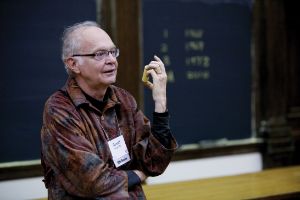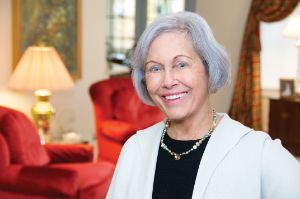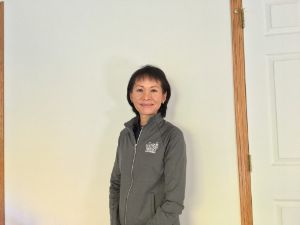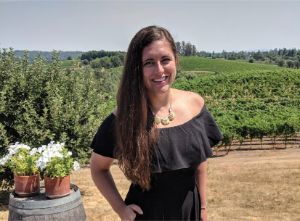connect
Honoring Five for Their Achievements
The Alumni Association of Case Western Reserve University recognized recipients of its 2020 Alumni Awards during a virtual Homecoming in October.
 PHOTO: Courtesy of the Case Alumni Association/Photography by Dasha Slobozhanina
PHOTO: Courtesy of the Case Alumni Association/Photography by Dasha SlobozhaninaDonald E. Knuth
Distinguished Alumni Award
Donald E. Knuth, PhD (CIT '60; GRS '60, mathematics; HON '80)
Donald Knuth published the first volume of his life's work—The Art of Computer Programming—in 1968. Today, his now four-volume opus remains the industry bible. The books are collectively among the most influential scientific works of the past century and evoke devotion from Silicon Valley heavyweights.
The volumes also have an enduring—and endearing—tie to what's now Case Western Reserve University where Knuth rewrote code for the school's then-latest technology: the IBM 650 mainframe computer. "This series of books," the author wrote, "is affectionately dedicated to the Type 650 computer once installed at Case Institute of Technology, in remembrance of many pleasant evenings."
Knuth's impact has been remarkably broad and deep. As an early and premier writer and analyst of algorithms (the directions that tell computers what to do), he was a pioneer in building the structure on which computer programming rests. And his invention of the TeX computer typesetting system is considered among the great contributions to typography since Johannes Gutenberg invented his revolutionary printing press in 1440.
Yet the ever-humble Knuth thinks of himself first as a writer sharing ideas: "If I discover a beautiful pattern that I can tell somebody about—that's a good day."
 Photo by Joe Sterbenc, Courtesy of the University of Chicago
Photo by Joe Sterbenc, Courtesy of the University of ChicagoRichard H. Thaler
Professional Achievement Award
Richard H. Thaler, PhD (ADL '67, HON '03)
Richard Thaler blew up economics by recognizing that humans are quirky, irrational beings whose decisions don't fit neatly into standard economic models.
The winner of the 2017 Nobel Prize for economics, Thaler is a founder of the field of behavioral economics and the Charles R. Walgreen Distinguished Service Professor of Behavioral Science and Economics at the University of Chicago. He also contributes regularly to The New York Times, has authored several bestselling books and portrayed himself in the 2015 movie The Big Short.
Thaler said his approach began percolating as "deviant thoughts" in graduate school when he wondered why economic models incorporated imaginary individuals who "are really smart, unemotional creatures with no self-control problems," when the people he knew "were absent-minded, overconfident, a bit overweight, but who sometimes donated to charity. 'Why the disconnect?' I would ask myself—and, on brave days, some of my professors."
His research has encompassed notions of fairness, efficiency in financial markets, the behavior of game-show contestants and how NFL teams can make smart draft picks.
"I like topics that I find intriguing and/or amusing," he said. "And if the results will be particularly annoying to my most persistent critics, then all the better."
 PHOTO: Daniel Milner Photography
PHOTO: Daniel Milner PhotographyNorma Geller
Newton D. Baker Distinguished Service Award
Norma Geller (SAS '91)
Normal Geller's service nourishes Northeast Ohio, from her work with people who are refugees, experiencing homeless or diagnosed with cancer, to funding research and social-justice initiatives.
At Case Western Reserve University, she and her late husband, Albert (CLC '52), made the lead gift for theAlbert & Norma Geller Hillel Student Center and endowed a professorship in ovarian cancer research. Geller also supports a health pathway program for School of Medicine students wanting to serve urban communities. "My husband's mantra was 'You only go through life once, so make a difference,'" Gellersaid."Mine is, 'When you see a need, act.'"
After 20 years of volunteering at University Hospitals (UH), she COURTESY OF returned to college at 45 and later earned a master's degree in social work from what's now the university's Jack, Joseph and Morton Mandel School of Applied Social Sciences. After four months as a hospital social worker, Geller was diagnosed with ovarian cancer. Successful treatment followed, as well as volunteer work at several nonprofits.
"I am in the position to extend hope to other people," said Geller, who also established funds at UH and Cleveland Clinic to transport cancer patients for treatment. "I hope I've helped to make the world a better place."
 Ka-Pi Hoh
Ka-Pi Hoh
Daniel T. Clancy Alumni Service Award
Ka-Pi Hoh, PhD (CIT '84; GRS '87, '89, macromolecular science)
Ka-Pi Hoh builds wherever she goes, from mentoring women in STEM careers to designing and developing technical collaboration between U.S. and Chinese laboratories.
During a 32-year career at Lubrizol Corp., a specialty chemical manufacturer in Wickliffe, Ohio, Hoh has risen from research chemist to business process leader, overseeing programs to improve business efficiencies and applying organizational change management to support global initiatives.
"I have a feeling of responsibility to contribute to the greater good," said Hoh, who is deeply dedicated to Case Western Reserve University. She was a founding board member of The Alumni Association, has been on the advisory board for the Flora Stone Mather Center for Women and was an alumni representative on a CWRU strategic planning committee. She also is chair of the industrial advisory board for the university's Department of Macromolecular Science and Engineering, and serves on two visiting committees.
Hoh attributes her bridgebuilding skills, in part,to being raised in the United States by Chinese immigrant parents and learning to navigate between her two cultures. "Getting people connected," Hoh said, "whether between corporations and the university, or women entering the engineering field, or even between different cultures, is my passion."
 K. Grace Bell
K. Grace Bell
Young Alumni Award
K. Grace Bell (CWR '10)
K. Grace Bell loves to solve big, challenging health care problems.
In March, as COVID-19 led to a series of shutdowns, she took action after nurse practitioners at her health care company worried whether patients had enough food. Bell led a team to design and fund a program that rolled out days later and distributed more than 73,000 meals in four states by late August.
"Historically, healthy-food education has been a critical part of our work, and COVID-19 required that we think differently about food access for our patients," said Bell, who works in Los Angeles
At Case Western Reserve University, Bell created her major, combining finance and health care. She later worked for employers in fields from venture capital to government, learning to tackle health care issues from different angles
Bell works for CareMore Health, a subsidiary of Anthem Inc. that provides care for Medicare and Medicaid patients around the country. She manages a mobile-care program focused on high-risk patients and also is director of strategy for behavioral health.
She now hopes to help address this question: "How do we build systems or companies that combat societal disparities in race and income that are driving poor health outcomes?"





